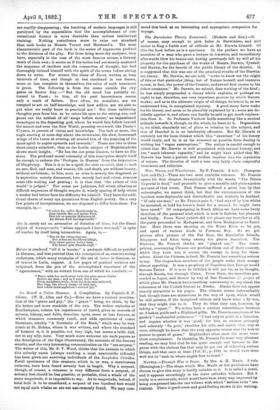The Darwinian Theory Examined. (Bickers and Son.)—It
of coarse, easy enough to piok holes in Darwinism, and still easier to fling a feeble sort of ridicule at Mr. Darwin himself. Of
this the book before us is a specimen. In the preface we have an anecdote of a man who gave a lecture in America, and immediately afterwards blew his brains out, having previously left by will all his property for the purchase of the works of Messrs. Darwin, Tyndall, and Huxley, for the benefit of the public library of the district. It is suggested that this was one of the practical results of the Darwin- ian theory. Mr. Darwin, we are told, "seeks to know not the origin of this or that particular:thing, but of Nature herself, and ventures to test, in fact, the power of the Creator, and reveal first causes to his fellow-creatures." Mr. Darwin, we submit, does nothing of the kind ; he has simply propounded a theory which explains, or perhaps we ought to say, describes, one very important process by which Nature works ; and as to the ultimate origin of all things, he leaves it, as we understand him, in unexplained mystery. A. good many facts make for his theory, and seem to be plausibly explained by it ; some are de- cidedly against it, and others can hardly be said to get much explana- tion from it. So Professor Virchow holds something like a neutral attitude towards it, though, on the whole, he leans to it. Dogmatism is, we think, singularly out of place in relation to the subject, and that of Haeckel is to us intolerably offensive. But Mr. Darwin is certainly not the loose thinker which this " examiner " of his theory would imply, and he is as far removed as possible from dealing in nothing but "vague assumptions." The author is candid enough to admit that Mr. Darwin is well acquainted with natural history, and has "much inherent capacity," and he might have added that Mr. Darwin has been a patient and modest inquirer into the mysteries of nature. The theories of such a man may fairly claim respectful treatment and criticism.


































 Previous page
Previous page